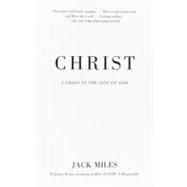
Note: Supplemental materials are not guaranteed with Rental or Used book purchases.
Purchase Benefits
Looking to rent a book? Rent Christ A Crisis in the Life of God [ISBN: 9780679781608] for the semester, quarter, and short term or search our site for other textbooks by Miles, Jack. Renting a textbook can save you up to 90% from the cost of buying.
| Prologue: Crucifixion and the Conscience of the West | 3 | (10) | |||
| A Note to the Reader | 13 | (2) | |||
| PART ONE: THE MESSIAH, IRONICALLY | |||||
|
15 | (2) | |||
|
17 | (6) | |||
|
23 | (5) | |||
|
28 | (5) | |||
|
33 | (2) | |||
|
35 | (1) | |||
|
36 | (4) | |||
|
40 | (3) | |||
|
43 | (4) | |||
|
47 | (4) | |||
|
51 | (12) | |||
|
63 | (8) | |||
|
71 | (5) | |||
| PART TWO: A PROPHET AGAINST THE PROMISE | |||||
|
76 | (1) | |||
|
77 | (2) | |||
|
79 | (4) | |||
|
83 | (9) | |||
|
92 | (17) | |||
|
109 | (9) | |||
|
118 | (6) | |||
|
124 | (6) | |||
|
130 | (5) | |||
|
135 | (2) | |||
|
137 | (4) | |||
|
141 | (4) | |||
| PART THREE: THE LORD OF BLASPHEMY | |||||
|
145 | (3) | |||
|
148 | (4) | |||
|
152 | (8) | |||
|
160 | (4) | |||
|
164 | (7) | |||
|
171 | (7) | |||
|
178 | (7) | |||
|
185 | (4) | |||
|
189 | (4) | |||
|
193 | (6) | |||
| PART FOUR: THE LAMB OF GOD | |||||
|
199 | (9) | |||
|
208 | (5) | |||
|
213 | (11) | |||
|
214 | (1) | |||
|
215 | (3) | |||
|
218 | (3) | |||
|
221 | (3) | |||
|
224 | (8) | |||
|
232 | (4) | |||
|
236 | (11) | |||
| Epilogue: On Writing the Lives of God | 247 | (10) | |||
| Appendix I: One Bible from Many Scriptures (How It Happened and Why It Matters) | 257 | (8) | |||
| Appendix II: The Bible as Rose Window (or, How Not to See Through the Bible) | 265 | (26) | |||
| Acknowledgments | 291 | (2) | |||
| Notes | 293 | (40) | |||
| Index of Scripture Citations | 333 | (4) | |||
| General Index | 337 |
The New copy of this book will include any supplemental materials advertised. Please check the title of the book to determine if it should include any access cards, study guides, lab manuals, CDs, etc.
The Used, Rental and eBook copies of this book are not guaranteed to include any supplemental materials. Typically, only the book itself is included. This is true even if the title states it includes any access cards, study guides, lab manuals, CDs, etc.
Excerpted from Christ: A Crisis in the Life of God by Jack Miles
All rights reserved by the original copyright owners. Excerpts are provided for display purposes only and may not be reproduced, reprinted or distributed without the written permission of the publisher.